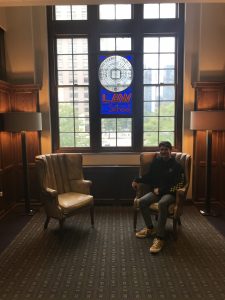By Jakob Franco
Co-editor | The Pacific Times
The college search process is the culmination of four years of work in high school and an extremely daunting task. Trolling for information online brought on an onslaught of testimonials and statistics which left me feeling more informed, but still ill-equipped to make a decision.
My solution: To visit, in person, as many of the colleges as I was interested in as possible.
I made a list of roughly 20 universities and am happy to say I have made a trip to each. In doing so, I explored all regions of California and traversed approximately 6,700 miles to see schools in the midwest and along the east coast.
These visits proved incredibly useful, but after listening to dozens of tour guides make their pitch, I began to pick up on distinct patterns at each college I visited.
To begin with campus safety, universities wish to appear as welcoming havens for parents to send their children off to. As such, each tour guide will happily explain how comfortable they have felt during their time on campus and inevitably point out their university’s blue light system.
These poles scattered across campus call local police to the location when activated in an emergency and every college brags about their own prompt response time. The blue light system serves largely the same purpose as anyone with a mobile phone in their hand, but remain the darlings of universities everywhere.
Onto the academics of college life, the single word I heard most often on tours was collaboration. Collaboration among students as well as with faculty is promoted as thriving at every campus I visited. Most tour guides, particularly among the Ivies, then went on to deride other universities which encouraged a spirit of cutthroat competition among their students. This seems to present a mathematical impossibility with every school claiming to be unique in their cooperative learning environment.
Universities also frequently promote the wonderful accessibility of their professors in class and during office hours. They often treat the idea of professors teaching classes as a rare luxury, but this again is a point raised during every tour I experienced. Even though assistants play a role at every university, professors are still there to offer their wealth of experience to students. Universities may raise a small faculty to student ratio in classrooms, but this is only an average between large undergraduate lectures and tiny upper division classes.
These dramatic similarities among colleges give the impression of the same tour simply given in a new location. And from this I feel there are a few key points to take away.
The first being that yes, colleges in many ways are extremely similar and that might not be a bad thing. This place will be home for the next four years and the branching off point for adult life which puts a lot of pressure to make the right decision or to get into the perfect school. However, no school is wholly perfect and falling short of your dream school does not mean you will receive a second-class education.
Second, when researching and comparing schools it is important to look beyond the surface level information every university provides. If you can, go to the schools and simply place yourself in different spots around campus asking whether you could see yourself fitting in. And while on tour, ask your guide what things they wish to see improved on campus and what possible misconceptions they had when they entered.
Even without in-person visits, research the aspects of each university which truly define their culture from student perspectives. These features can include long–standing traditions and important landmarks on campus for students.
Finding the right college will always be a somewhat terrifying exercise, but it can be made less so with thorough preparation beyond the facts given by one page of a brochure.






Speak Your Mind
You must be logged in to post a comment.